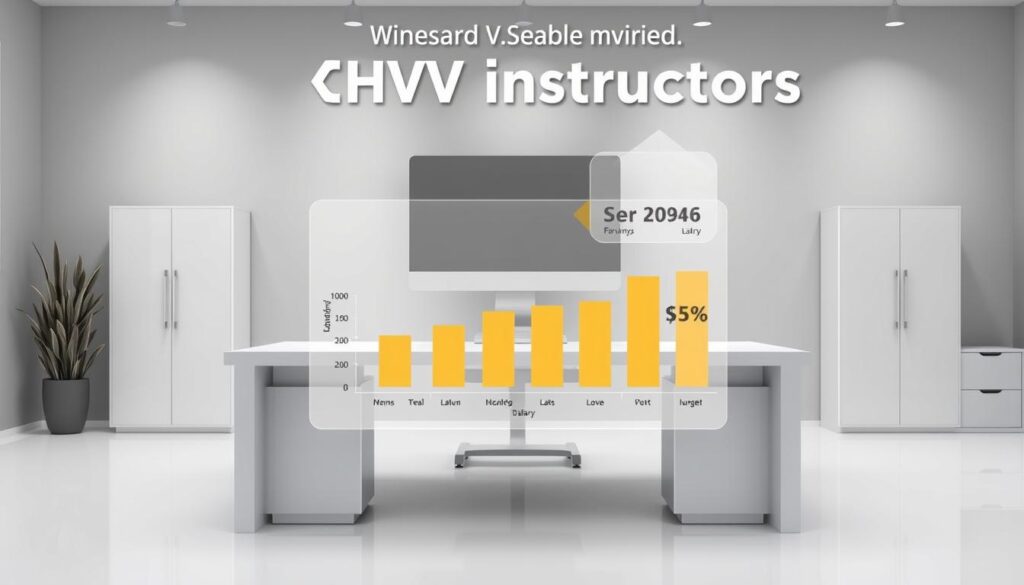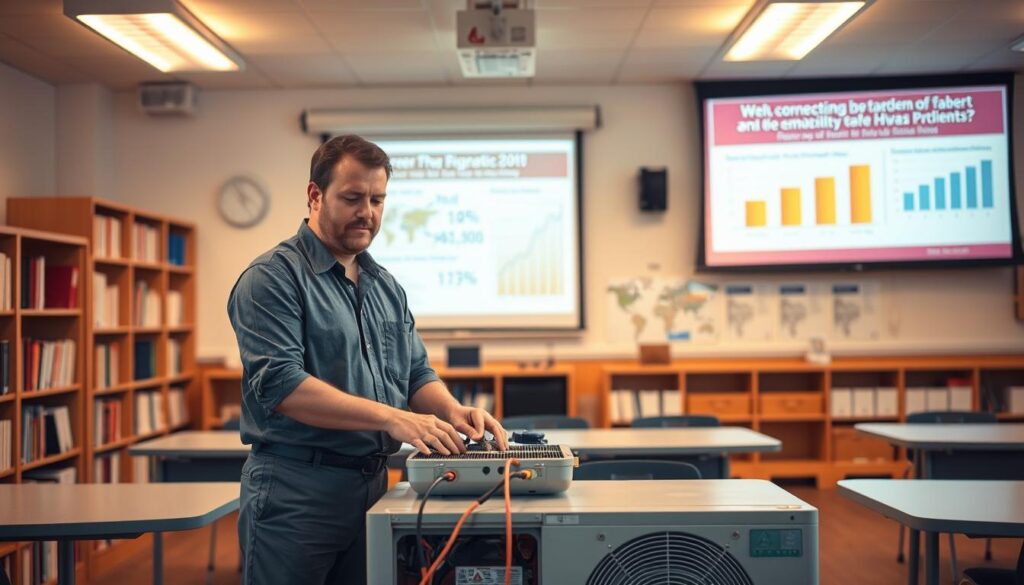Affiliate Disclosure
HVAC Guide Guys is a participant in the Amazon Services LLC Associates Program, an affiliate advertising program designed to provide a means for sites to earn advertising fees by advertising and linking to Amazon.
How Much Do HVAC Instructors Make? Are you curious about the financial rewards and professional excitement of being an HVAC instructor? Technical education offers a chance for skilled professionals to share their knowledge and inspire the next generation.

Discovering how much HVAC instructors earn shows a promising career path for those eager to teach. The salary depends on experience, location, and specialized skills.
HVAC instructors are key in meeting the growing demand for skilled technicians. Your knowledge can lead to a stable and potentially lucrative career, beyond just technical work.
Key Takeaways
- HVAC instructor salaries offer competitive compensation
- Multiple factors influence earning
- Technical education provides stable career opportunities
- Specialized certifications can boost income
- Geographic location impacts salary ranges
Table of Contents
Understanding the HVAC Education Industry
The HVAC education world is changing fast, opening up new chances for teachers and learners. With new tech and more buildings, the need for good HVAC trainers is rising. This is key for teaching in technical fields.
The Growing Demand for HVAC Education
Your chance to earn as an HVAC teacher is linked to the industry’s growth. The US Bureau of Labor Statistics says the HVAC field will keep growing. It will have about 38,500 job openings each year. This growth affects how much HVAC trainers can earn and the chances for learning.
- Projected industry growth: 5% from 2020 to 2030
- Annual job openings: 38,500
- Increasing technological complexity in HVAC systems
Role of HVAC Instructors in Technical Education
HVAC teachers are key in filling skill gaps in the field. They turn technical knowledge into hands-on training. This prepares students for real-world problems. Your teaching skills shape the next generation of HVAC experts.
Industry Growth Projections
The HVAC education area is always changing. New tech like smart homes and green energy opens up special areas for teachers.
| Industry Segment | Growth Potentia | Training Demand |
|---|---|---|
| Residential HVAC | 4.2% | High |
| Commercial Systems | 5.5% | Very High |
| Green Technology | 7.3% | Emerging |
Knowing these trends helps you find your way in this field. It can help you make the most of your teaching career.
Explore Our HVAC Shop
Looking for top-rated HVAC tools, parts, and accessories? Visit our shop and find the perfect solution for your needs.
Visit the ShopHow Much Do HVAC Instructors Make: National Salary Overview
Understanding how much HVAC instructors make is key for those thinking about teaching. The national picture shows a bright financial future for those in this field.
HVAC instructors get paid based on their skills and knowledge. Salaries vary, but they usually fall between $45,000 and $85,000 a year. Your pay can change based on:
- Educational credentials
- Professional experience
- Geographic location
- Type of educational institution
New HVAC instructors start around $42,000, while those with more experience can make up to $95,000. Schools and training centers offer good pay.
The demand for qualified HVAC instructors keeps growing. This means more chances for good pay across the U.S.
Compared to regular HVAC techs, instructors have more job security and benefits. You play a big role in training the next HVAC techs. This makes you very important in education.
Factors Affecting HVAC Instructor Salaries
Understanding how much HVAC instructors make involves looking at several important factors. Your salary isn’t just based on one thing. It’s about your skills, experience, and where you work.
Many things affect how much HVAC teachers get paid in the United States:
Educational Requirements Impact
Your education level is key to your salary. Getting more education can really help you earn more:
- Associate’s degree: Entry-level pay
- Bachelor’s degree: Better pay
- Master’s degree: Even more money
- Professional certifications: More money
Experience Matters
How long you’ve been teaching affects your pay. More experience means higher salaries:
- 0-3 years: Starting pay
- 4-7 years: Better pay
- 8+ years: Top pay
Geographic Considerations
Where you live also affects your salary. Cities and areas needing more technical skills often pay more than rural places.
Institutional Variations
The school you teach at also matters a lot. Community colleges, technical schools, and private centers pay differently. Each offers its own salary chances.
Explore Our HVAC Shop
Looking for top-rated HVAC tools, parts, and accessories? Visit our shop and find the perfect solution for your needs.
Visit the ShopRegional Salary Variations for HVAC Instructors
Your salary as an HVAC instructor can change a lot based on where you teach. The United States has different areas with their own pay scales for HVAC teachers. These vary due to local economy and demand for skills.
The best-paying spots for HVAC teachers are often big cities with lots of construction and industry. Places like California, Texas, and New York pay more. This is because they have active markets for technical education.
- Northeast Region: Highest average salaries ($65,000 – $85,000)
- West Coast: Strong technical education markets ($60,000 – $80,000)
- Midwest: Stable but moderate salaries ($50,000 – $70,000)
- Southern States: Growing opportunities ($45,000 – $65,000)
Big cities usually pay more than small towns. Colleges in big cities often give better pay. This is because living costs are higher and there’s more need for skilled HVAC workers.
“Location can make a substantial difference in an HVAC instructor’s earning” – Technical Education Quarterly
Your exact pay will depend on many things. These include local job market, type of school, and the area’s economy. Looking into local job markets can help you find the best place to earn more in HVAC education.
Education and Certification Requirements
To become an HVAC instructor, you need more than technical skills. Your salary as an HVAC teacher depends on your education and certifications. You must meet certain educational and certification standards to prove your knowledge and teaching skills.
Starting your HVAC instructor career requires solid training and recognized credentials. You’ll need to get various certifications and keep learning to stay competitive in your salary.
Mandatory Certifications
You must get key certifications to show your expertise:
- EPA 608 Certification – Required for handling refrigerants
- NATE (North American Technician Excellence) Certification
- State-specific HVAC teaching credentials
Advanced Credentials
Getting advanced credentials can boost your career and salary:
- Master HVAC Technician Certification
- Professional Teaching Certification
- Industry-specific specialized training programs
Continuing Education
Keeping up with new technologies is vital. Continuous learning helps you stay ahead in the HVAC education field.
“Education is the passport to the future, for tomorrow belongs to those who prepare for it today.” – Malcolm X
| Certification Level | Average Salary Impact | Career Advancement |
|---|---|---|
| Basic Certification | $55,000 – $65,000 | Entry-Level Instructor |
| Advanced Certification | $70,000 – $85,000 | Senior Instructor |
| Master Certification | $85,000 – $100,000 | Program Director |
Investing in your professional growth is essential for a high hvac instructor salary and a fulfilling career in technical education.
Explore Our HVAC Shop
Looking for top-rated HVAC tools, parts, and accessories? Visit our shop and find the perfect solution for your needs.
Visit the ShopCareer Progression and Salary Growth

Starting a career as an HVAC instructor opens doors to growth and better pay. You’ll begin with entry-level jobs and move up to more advanced and lucrative roles.
Your first steps might include:
- Assistant instructor positions
- Laboratory technician roles
- Part-time teaching assignments
With more experience, your pay can rise. You could become:
- Department head
- Program director
- Curriculum development specialist
Professional development is key to earning more. Getting extra certifications and training can increase your salary. Many instructors also move into:
- Educational consulting
- Administrative roles in technical institutions
- Industry training program management
The best HVAC instructors keep learning, network, and find new opportunities. They stay up-to-date with the latest technologies and teaching methods.
Benefits and Additional Compensation
HVAC instruction earnings go beyond just a salary. They come with complete compensation packages that draw skilled professionals. When looking at hvac training wage, it’s important to consider all the benefits offered by schools and training centers.
HVAC instructors get more than just a paycheck. They receive a strong benefits package. These extras can boost your earnings and job happiness.
Healthcare and Insurance Options
Most schools for HVAC offer great health coverage. This includes:
- Full medical insurance
- Dental coverage
- Vision care plans
- Life insurance
Retirement Planning Support
Retirement benefits are key in hvac instruction earnings. Many employers provide:
- 401(k) retirement plans
- Matching contribution programs
- Pension options for long-term educators
Professional Development Opportunities
Your hvac training wage can increase with professional growth support. This includes:
- Funding for advanced certifications
- Conference attendance sponsorship
- Continuing education reimbursement
- Industry conference travel support
These benefits show why HVAC instruction is a rewarding and lucrative career for technical education professionals.
Comparing HVAC Instructor Salaries to Industry Technicians
Exploring careers in the HVAC industry means looking at the money side too. The hvac teaching pay scale is an interesting choice compared to being a technician. It offers special pay chances.
HVAC instructors get paid differently than field technicians. Technicians do hands-on work, while instructors teach in schools. They use their knowledge to educate others.
| Career Path | Average Annual Salary | Job Stability |
|---|---|---|
| HVAC Technician | $48,593 | Moderate |
| HVAC Instructor | $55,000 – $72,000 | High |
Being an HVAC instructor has its perks:
- More predictable work schedules
- Potential for additional benefits
- Opportunities for professional development
- Less physical strain compared to field work
Switching from technician to instructor can lead to long-term career growth. You might earn more and feel more fulfilled in your job.
Explore Our HVAC Shop
Looking for top-rated HVAC tools, parts, and accessories? Visit our shop and find the perfect solution for your needs.
Visit the ShopPart-Time vs Full-Time Teaching Opportunities

Looking into part-time and full-time teaching jobs can really change your hvac educational income. HVAC instructors have many ways to share their skills and make money in technical education.
Part-time teaching has its perks for those wanting to earn extra. It offers flexibility and keeps experienced technicians up-to-date with industry trends.
- Part-time teaching benefits:
- Flexible scheduling
- Supplemental income stream
- Maintaining active industry connections
- Full-time teaching advantages:
- Stable salary
- Comprehensive benefits package
- Career advancement opportunities
Your income depends on a few things. Part-time instructors get paid by the hour, while full-time jobs offer steady pay with chances for raises and growth.
Strategic approach: Many HVAC pros start with part-time jobs to gain experience before moving to full-time roles. This way, they can try out teaching while keeping their main job.
When deciding between part-time and full-time teaching, think about your career goals, current job, and future plans in HVAC education.
Job Outlook and Future Earnings
The job outlook for HVAC instructors is promising. The US Bureau of Labor Statistics says there will be about 38,500 job openings each year. To understand how much HVAC instructors make, we need to look at several factors.
Your earning power as an HVAC teacher depends on a few trends:
- Technological advancements in green energy systems
- Increasing complexity of smart home technologies
- Growing demand for specialized technical education
- Retirement of current industry professionals
Specializations will also play a big role in your earnings. Those who focus on sustainable technologies and advanced system designs can earn more.
| Specialization | Potential Salary Impact |
|---|---|
| Green Technology | +15% Salary Increase |
| Smart Home Systems | +12% Salary Increase |
| Commercial HVAC | +20% Advanced Earnings |
Your career will grow with continuous learning and advanced certifications. Investing in professional development can greatly increase your earnings and job prospects.
“The future belongs to those who are willing to learn and adapt in technical education.” – Industry Expert
Explore Our HVAC Shop
Looking for top-rated HVAC tools, parts, and accessories? Visit our shop and find the perfect solution for your needs.
Visit the ShopTeaching Specializations and Their Impact on Salary
In the world of HVAC education, specializing can really boost your pay. Different areas of focus can lead to better salaries and career growth.
HVAC teachers can choose to focus on areas that are in demand. This can lead to higher salaries and better job opportunities.
Commercial HVAC Systems
Teaching commercial HVAC systems can be very rewarding. These systems need advanced knowledge and skills, leading to better pay.
- Advanced training in large-scale industrial systems
- Expertise in complex climate control technologies
- Understanding of commercial building regulations
Residential HVAC
Teaching residential HVAC is always in demand. Teachers who know a lot about home heating and cooling systems often have stable and fulfilling careers.
- Comprehensive residential system knowledge
- Installation and maintenance techniques
- Energy efficiency best practices
Green Technology and Sustainability
New green technologies are changing HVAC. Teachers who know about sustainable solutions can earn more.
- Renewable energy integration
- Energy-efficient system design
- Environmental impact understanding
By keeping skills up to date and focusing on special areas, HVAC teachers can earn more. They also help the industry grow.
Conclusion
Exploring hvac instruction earnings shows a promising career for skilled people. The HVAC education field offers good pay and growth chances. Your earnings can change based on experience, specialization, and where you work.
To know how much HVAC instructors make, look at several career aspects. Your technical skills, advanced certifications, and ongoing learning can increase your pay. Schools value instructors with real-world experience and up-to-date knowledge.
Being an HVAC instructor is more than just money. You’ll help train the next HVAC techs, helping the industry grow and become more sustainable. By keeping up with new tech and improving your skills, you’ll have a fulfilling career.
If you’re thinking about starting or growing in this field, HVAC instruction is full of opportunities. Keep learning, get specialized training, and love sharing your knowledge with future professionals.

